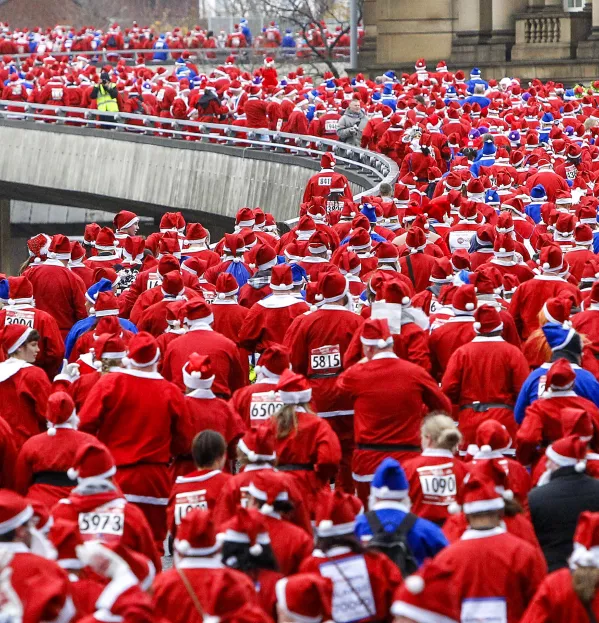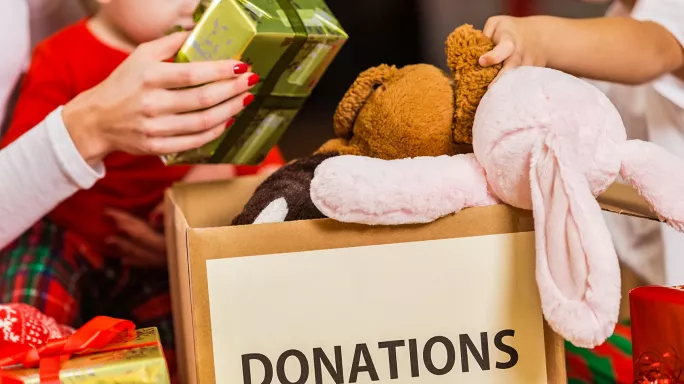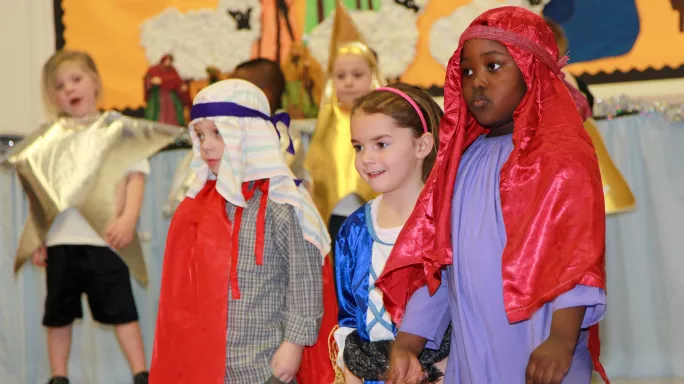
- Home
- Teaching & Learning
- General
- How schools are supporting their communities this Christmas
How schools are supporting their communities this Christmas

On the first weekend of December, thousands of Santas descended on Liverpool city centre. It was, says Lindsey Collins, assistant vice-principal at Hillside High School in Bootle, Merseyside, “a sea of red”, with the occasional blue suit in there, too - “for Everton”, she adds.
The Santas, including 18 members of staff from Hillside, were taking part in Liverpool’s Santa Dash: an annual 5k fun run to raise money for charity. It’s the biggest and longest-established Santa run in the UK and, this year, the proceeds from entry fees went to the local Alder Hey Children’s Hospital.
The staff from Hillside, however, were dashing through the Albert Dock in the freezing cold for another very important cause: to help fund Christmas hampers for disadvantaged families in their school community.
“We set up a JustGiving page [that allows people to donate in sponsorship], and all the money from that goes into feeding our community at Christmas,” says Collins.
It’s one example of a school going above and beyond to support local families in the run-up to Christmas - but it’s far from the only one.
‘We can’t ignore these issues’
Across the country, while preparations for nativities and Christmas fairs are in full swing, there’s also plenty of less visible work going on.
For some schools, pupils who need extra help at this time of year make up a significant proportion of their intake.
Recent data from the Department for Work and Pensions shows that, after factoring in housing costs, 29 per cent of children in the UK were living in relative poverty in 2021-22.
Meanwhile, the latest Programme for International Student Assessment survey revealed that 11 per cent of 15-year-olds in the UK are missing a meal at least once a week because of a lack of money.
Helping families with essentials like food and utilities is a job that, arguably, shouldn’t fall to schools, but with the cost-of-living crisis showing no signs of easing, many are taking it upon themselves to do what they can.
“We know that if circumstances are difficult for children at home, then that is going to affect their education,” says Fiona Carrick-Davies, family and community coordinator at Surrey Square Primary School in London.
“Schools shouldn’t have to do the kinds of jobs that we do, but we can’t ignore these issues if they’re affecting our pupils,” she continues.
“We really feel that, at the moment, if we don’t offer support, nobody else is going to do it.”
Plugging the gaps
And with Christmas just around the corner - typically an expensive time for everyone - some schools feel they have been left with little choice but to offer increasing levels of assistance, says Jean Gross, an expert in supporting disadvantaged pupils.
“I do think schools are having to plug gaps, sadly. Local services have been stripped to the bone,” she says.
However, Gross adds, “the schools I admire the most don’t waste time saying it’s not their job - they just crack on”.
But there’s a tricky balance for leaders to strike here: offering as much help as they can while protecting their staff from ever-growing workloads.
So, what can schools do to support families at Christmas, without placing too much of a burden on staff?
Here, four schools talk about what they’re doing to help their communities during the festive season.
‘Sometimes families are in tears when they thank us’
Christmas is a particularly difficult time. It’s difficult for most of us, let alone people who are already struggling, and our school is in one of the most deprived areas in the country - in Bootle, Merseyside, in the borough of Sefton.
More than 50 per cent of our students are disadvantaged, but you wouldn’t know it if you were to walk around our school.
One of the things we do to help is our Christmas hamper meal appeal. Each form class brings in donations to make up a hamper to give to a family in our school community who needs it. Considering we are in a deprived area, the children are so giving.
The vice-principal goes out in the school minibus to deliver the hampers and says it’s one of the most rewarding days of his whole year, just to see people who are so grateful.

We also hold a Christmas market, where we have a grotto and a bouncy castle, to raise money for the community.
On top of that, 18 of us ran the Liverpool Santa Dash this year, and we all got sponsored. We’re still buzzing from that. We’re hoping to get to about £1,500 in sponsorship, and our Christmas market raised £1,400.
With the money, we’ll make a donation to a local food bank - Sefton Community Pantry - and then convert the rest into vouchers to give to families in need so that they can buy food and what have you over Christmas.
We also hold some money back to support families in January, because January can often be even worse.
In all this, staff are really willing to get involved and we know that the help is incredibly appreciated. Sometimes, families are in tears when they thank us.
A few months ago, one of my colleagues overheard a conversation between two old ladies in the local supermarket. One said to the other: “The only people who do anything for our community are Hillside.”
Lindsey Collins is assistant vice-principal at Hillside High School in Bootle, Merseyside
‘Where there are things we can change, we feel it’s our duty to do that’
Our primary school is based on the edge of the Aylesbury Estate in London, which is one of the biggest housing estates in the country. It’s an area of great deprivation.
About 25 per cent of our pupils live in temporary accommodation, and 85 per cent of them are from income-deprived households, according to the Income Deprivation Affecting Children Index.
About 7 per cent of our pupils live with no recourse to public funds as well - that’s where restrictions on their immigration status mean that they don’t have access to any benefits at all, including social housing.
Where there are things that we can affect and change and support with, we feel it’s our duty of care to do that so that children start on a level playing field with their classmates.
At Christmas, we provide a lot of our children with presents. We have a partnership with a law firm called Proskauer Rose LLP. We send them a Christmas wish list every year and they provide us with boxes of brand-new toys, games, books and art materials.
We use our vulnerability matrix to identify families that we know will really struggle over the Christmas period, and we invite the parents to come and choose the gifts they want. We also provide wrapping paper, so they can wrap the presents themselves. It’s not a present from the school, we always say - it’s from the parents to their children.
Of course, not all our families celebrate Christmas, but we still include them.

We’ve also been working with The Caring Family Foundation, who have been providing ready meals for families to take home at the end of the day.
This year, they organised a “winter wonderland” day for the whole school, with a grotto, face painting, balloon animals and a meal cooked by chefs from The Ivy and Bill’s. Every child went home with a present after a day full of fun and magic.
Something else that we do is provide referrals to local food banks and other organisations, such as Spring Community Hub and Walworth Living Room. A lot of it is about signposting. That’s a key element to what we can offer; we’ve got so many great partnerships.
There are lots of activities as well. Being stuck in your home for two weeks over the holidays is not much fun, so we have a sports provision that some of our children come along to, and we also remind families what else is available in the area, often for free.
Even things like going on a bus route through the centre of London - the 53 bus, from just round the corner from our school, takes you all the way past Trafalgar Square and along Oxford Street, and just the experience of seeing the lights and going across the bridge at Christmas is fun.
But all I’ve just described is what we call our “sticking plaster” work. It’s helping the situation but not changing it. We need wider change on things like housing issues and child citizenship, and we do a lot of campaigning as a school around that, too.
Fiona Carrick-Davies is family and community coordinator at Surrey Square Primary School in London
‘Some need help with more than just material things’
I’m at a grammar school in the Midlands. It’s an area of high deprivation and there can be quite a lot of violence. But being a grammar school, we don’t have a catchment area; if you pass the test, you’re in, and every year we take 30 per cent pupil premium students.
We really do have both ends of the spectrum: we have the families that are very well off, and then we have the families that are pretty much in destitution. So, it’s a difficult balance.
In terms of support at Christmas, any family that needs it has access to our community hub. This is a big container to the side of the school, where we keep all our food parcels and pre-loved uniforms. We also provide laptops and preloaded data cards for the internet.
But some young people need help with more than just material things at this time of year. Christmas can be tense, with lots of stress within the family. Drinking may be a problem, as well. There’s also seasonal stuff - it’s dark, it’s cold, it’s miserable and that can have an impact on students, too.
For some, home isn’t their safe space. Parents might be arguing all the time, so they don’t find home a comforting place to be.
So, the holidays can be tough. And external services aren’t always great at keeping in touch and going to see people if they are involved with them.
It’s difficult because there’s technically no safeguarding responsibility for schools during the holidays. But my team and I find that we can’t just shut down and go, “well, hopefully we’ll see you in two weeks”.
I always come back to a moment, two years ago, when I had a suicide note emailed to me during a half term. Thankfully, everything was OK, but I know that I can’t completely down tools over Christmas. I wouldn’t have a good holiday doing that, so there will be a handful of students that we’ll email and maybe call and check in with.
The writer is safeguarding lead at a secondary school in the Midlands
‘It’s not just at Christmas that people get lonely’
There is huge need in our area and we are finding that more and more families are requiring help. Many children don’t meet the criteria for free school meals because their parents work, yet don’t earn enough to make ends meet.
Throughout the year, we do a lot of work around what we call “poverty proofing”. For example, we buy essentials, such as water bottles and uniform, for children who don’t have them.
We also ask for donations for our partnership with One Church’s Love Your Neighbour Foundation, which provides food and support to families in the local community.
But this Christmas, we are also working on several campaigns to help us do more.
Firstly, we are promoting a charity single called Alone Over Christmas by an artist called St Lundi, who used to be a pupil at our school. He visited recently to talk to the children about food poverty, as well as perform his new single, and he is returning at the end of term to perform with the children for the parents. All proceeds from the single go to the Portsmouth Foodbank.
We’re also doing a Christmas jumper swap, whereby children bring in a jumper and swap it for another. We’ve collected spares, so those children who never have one, because their parents can’t afford it, get to take one without having one to swap. We collect the jumpers first, so the children don’t even know if their parents have brought one in or not.

On top of this, we’re trying to get our pupils involved in helping the wider community. For example, we have a group of children who help pack groceries for the Love Your Neighbour Foundation, and another group who are making sleeping bags for rough sleepers. We have also asked the parish priests if they know of anyone who may be lonely and would like to attend one of our nativities or the carol service.
Our preschoolers also went to visit a local care home to give the residents Christmas cards they’d made. This went down really well with the residents, which was so lovely to hear.
We’re going to keep that connection going. It’s not just at Christmas that people get lonely. So, we’ll try to arrange other visits across the year, too.
It’s the same with support for pupils and their families. The need isn’t going away; it will still be there, even after Christmas.
Jeff Sendall is headteacher of St Thomas More’s Catholic Primary School in Havant, Hampshire
You need a Tes subscription to read this article
Subscribe now to read this article and get other subscriber-only content:
- Unlimited access to all Tes magazine content
- Exclusive subscriber-only stories
- Award-winning email newsletters
- Unlimited access to all Tes magazine content
- Exclusive subscriber-only stories
- Award-winning email newsletters
You need a subscription to read this article
Subscribe now to read this article and get other subscriber-only content, including:
- Unlimited access to all Tes magazine content
- Exclusive subscriber-only stories
- Award-winning email newsletters
- Unlimited access to all Tes magazine content
- Exclusive subscriber-only stories
- Award-winning email newsletters
topics in this article



